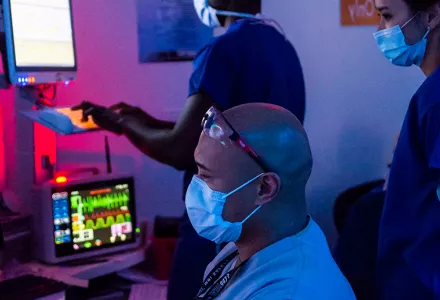
Why Leveraging Data Will Improve Servicemember Health and Chart a Pathway for the Public Good
Download the Full Publication
Abstract
Recent growth in artificial intelligence (AI) and machine learning (ML) is poised to revolutionize industries and economies, while a supporting drive to leverage large data sets is a crucial component of that effort. The Department of Defense (DoD) currently owns one of the most extensive collections of medical data in the world. By harnessing this data, the DoD could make significant advances in diagnostic care, pathology research, and force readiness. However, questions of privacy and patient rights remain a concern when accessing and analyzing the data. This research paper examines the intersection of privacy, artificial intelligence, policy, and medical advancement. Through interviews with senior military leaders, technologists, medical professionals, and academia, the research examines the potential impacts of leveraging artificial intelligence and machine learning within DoD healthcare. The researchers also examine public policy documents and relevant technology research to discover policy solutions and highlight innovative remedies for this problem set. Specifically, could researchers harness the DoD’s large medical datasets while offsetting risk to patient privacy? Significant opportunities exist to make lasting impacts using DoD medical data. Recent national technol- ogy and defense policies provide a clear mandate to explore methods to properly and safely leverage this data. Still, DoD leadership must equip its AI researchers with unambiguous command authority to action this mandate. Finding ways to employ AI ethically remains a priority for DoD leaders, and advances in de-identification technology can protect patient privacy while achieving substantial research gains for broad societal benefit.
Introduction
The combination of computing power advancements, cloud storage, and sophisticated machine learning algorithms has allowed for significant opportunities to achieve breakthroughs in healthcare using Department of Defense (DoD) medical data. The Joint Pathology Center (JPC), an organization owned by the DoD, controls the world’s largest tissue archive, located in physical warehouses. Recent national technology and defense policies provide a clear mandate to explore methods to safely and ade- quately leverage this data for medical researchers and practitioners. Large data storage and artificial intelligence have provided the tools to digitize, analyze, and use this data for servicemembers’ welfare. There are clear benefits to military medicine (increase readiness, reduce costs), but the value of this opportunity goes beyond the benefits it can provide for the military. The United States has the chance to take on a moonshot project that could cure many diseases. However, the US government cannot do it alone. Though the Department of Defense owns the data, it simply does not possess the requisite resources and expertise to leverage it for medical benefit. The DoD will need to seek external assistance from private sector innovators to get the job done. DoD leadership must equip its AI research- ers with unambiguous command authority to action this mandate and should immediately partner with competent commercial parties to leverage modern technology on DoD medical datasets.
Contents
Abstract
1. Introduction
2. Examining US and Department of Defense AI Policy
3. What Can AI/ML Bring to Military Healthcare?
Drive Down Costs
Increase Personnel Readiness
Optimize Personnel Performance
4. Health Data is a Strategic Asset
5. Empowering Concurrent Predictive Health Initiatives
6. COVID-19 and the Policy Mandate it Provides
7. Recommendations
Unambiguous Command Authority
Industry and Academic Partnerships
Data Digitization
Final Note
Download the full publication:
Hudgins, Jonathan, Lukas Bundonis and Pete Tortorici . “The Department of Defense, Artificial Intelligence, and Healthcare.” Belfer Center for Science and International Affairs, Harvard Kennedy School, November 20, 2020









